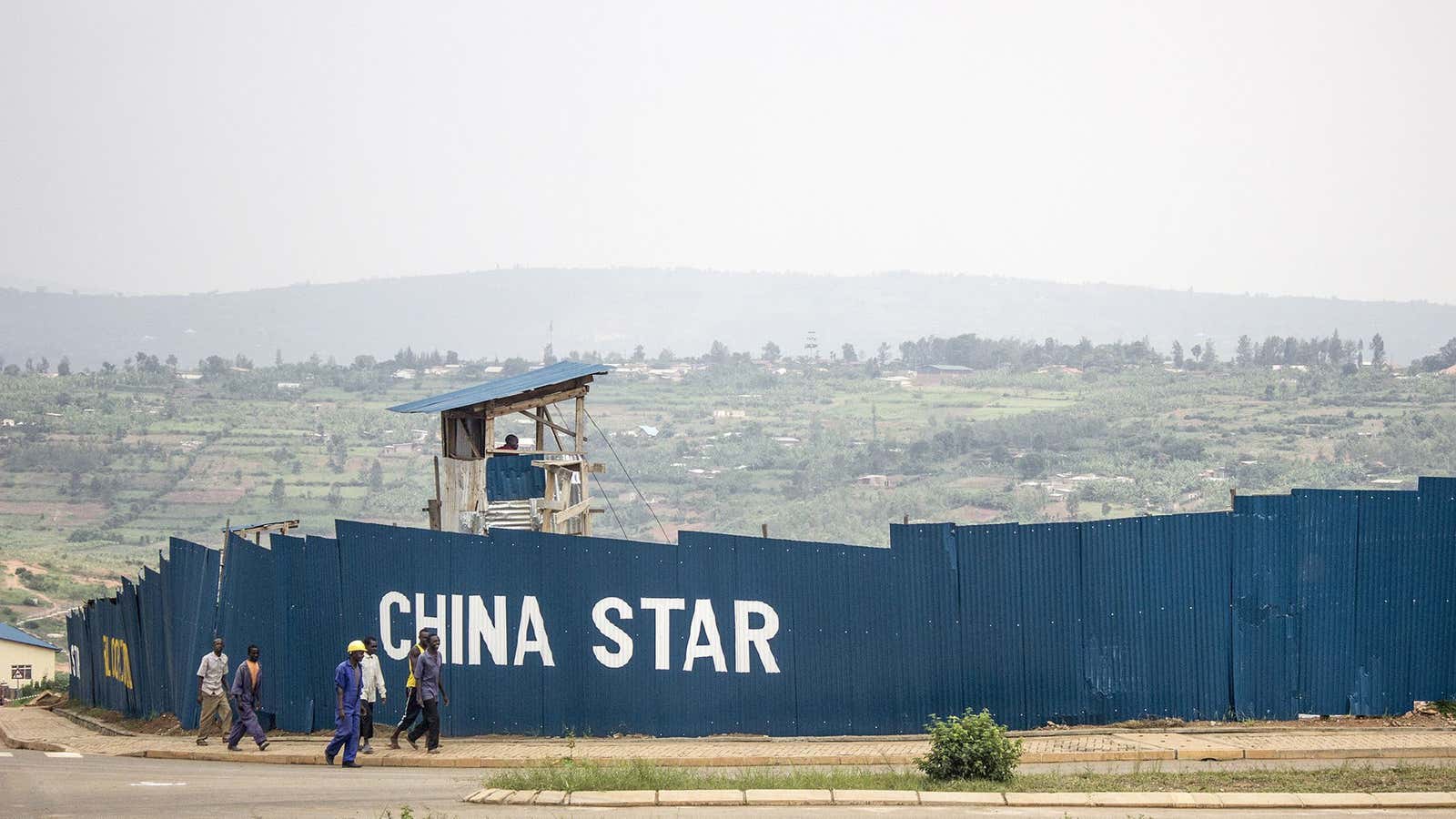Kigali, Rwanda
It’s hard not to see China’s footprint wherever one goes in Rwanda. Chinese engineers have designed and built the country’s tallest building, Kigali City Tower, a gleaming 20-story glass skyscraper; the building that houses Rwanda’s foreign ministry; various hotels, schools, and hospitals; and 80% of the country’s roads, according to a former Chinese ambassador to Rwanda. A sign on a primary school near government offices declares the school’s playground ”a gift from China.” A clinic in town offers acupuncture and traditional Chinese medicine.
There are less tangible signs too. Driving through the Kigali Special Economic Zone—a free-trade area on the outskirts of the capital, modeled after those that helped launch China’s economic opening in the 1980s—a man stopped our car to tell us that he’d been learning Chinese at the local Confucius Center, a cultural institute run by China’s ministry of education. He broke into song, singing in Mandarin about how much he likes learning Chinese, to the tune of “Happy Birthday.”
Rwanda doesn’t fit the usual narrative of China’s interest in Africa—namely that China is only interested in Africa for its mineral wealth, expanses of arable land, and potential as a dumping ground for Chinese-made goods. Small, landlocked Rwanda has few natural resources, and with a population about half that of Beijing’s, it offers a negligible new market for Chinese products.
Instead, private Chinese companies and entrepreneurs are investing in property, telecoms, manufacturing, and small-scale businesses like restaurants, car import outfits, and travel agencies. Big state-owned Chinese enterprises are building much of Rwanda’s roads and infrastructure, but not in exchange for oil or mining rights, as has been the case elsewhere.
As such, Chinese activity in Rwanda offers one of the best counterpoints to the oft-heard criticism that African countries are falling under the yoke of yet another foreign power. “Rwanda is home to 26,000 square kilometers of land and a population of 12 million. What city is there to attack? What land is there to invade?” a representative from the Chinese ministry of commerce in Kigali told Quartz.
A hub for Africa
Rwanda, which went from suffering one of history’s worst genocides in 1994 to becoming one of the fastest-growing economies on the continent, wants to establish itself as the business and technological hub of Africa. By attracting more foreign investment, Rwanda also hopes to wean itself from foreign aid, which accounts for almost 40% of its annual budget.
To that end, the government offers hefty tax incentives: Companies headquartered in Rwanda that invest at least $10 million are exempt from corporate income tax, while those that export at least 50% of their goods pay only 15% tax. Rwandan officials hosting Chinese trade delegations emphasize Rwanda’s stability, government transparency, and business-friendly regulations—it takes less than 24 hours, on average, to set up a company.
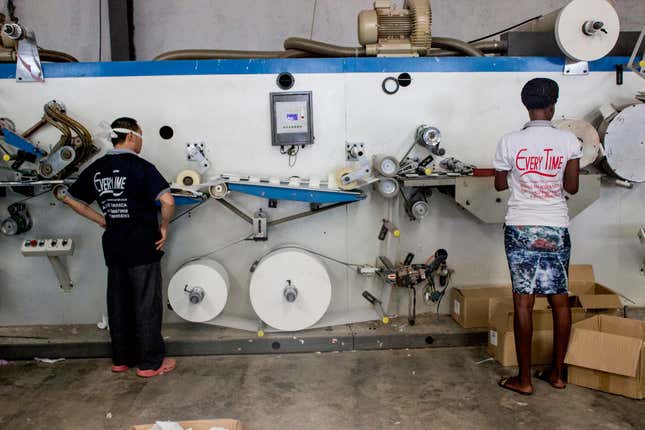
Chinese businesses seem to have gotten the message. In Kigali’s special economic zone, Chinese companies produce clothes, sanitary napkins, and wooden doors. A Chinese government-funded agricultural technology center to modernize Rwandan farmers is also focused on helping Chinese companies find new markets in the region. China emerged as Rwanda’s largest investor (pdf) after South Africa in 2009, and though it’s since fallen back to fifth place, it remains among Rwanda’s top trading partners. (China does import a relatively small amount of minerals from Rwanda, which is a leading exporter of tantalum, a metal used in mobile phones.)
Some of the most dominant Chinese companies in Africa got their start in the country. Star Times, a Chinese pay-TV provider, began its overseas efforts in Rwanda in 2008. It now rivals Africa’s biggest provider, DSTV, in 30 African countries. Tecno Mobile, a Chinese cellphone manufacturer whose cheap phones are ubiquitous across the continent, also chose Rwanda as one of its earliest markets.
Smaller-scale Chinese entrepreneurs are focused on the promise of Rwandan consumers. “They need everything, and in China we can make everything,” says Han Kai, who imports cars from China and the Middle East, selling them to locals who can’t quite afford the models imported from Japan.
All this is making Rwanda something of a service and logistics hub for China-Africa trade and business, according to Norbert Haguma, a Rwandan businessman whose consultancy advises on China-Africa issues. Rwandan shipping companies have started to offer container services to the Chinese manufacturing hubs Guangzhou and Yiwu. Traders can use instant money-transfer services to send money via popular Chinese platforms like WeChat and AliPay, converting between dollars, renminbi and Rwandan francs. Last year, Haguma’s company hosted a business forum that brought 150 Chinese and African businesses to Kigali.
“Chinese activity in Rwanda can illustrate more diverse types of Chinese involvement across African countries,” says Janet Eom, research manager of the China Africa Research Initiative at Johns Hopkins University, who has done field work in Rwanda.
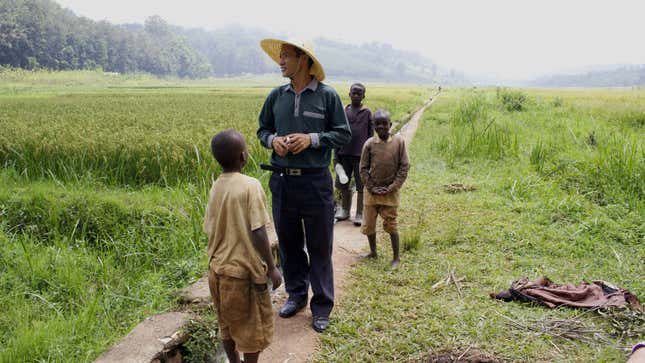
Elsewhere in Africa, Chinese investment is also becoming more diverse. Researchers Wenjie Chen and Hewai Tang, from George Washington University and Johns Hopkins University, looked at data between 1998 and 2012 from China’s Ministry of Commerce—all Chinese enterprises making direct foreign investments must register with the ministry. They found that among 2,000 Chinese firms in 49 African countries, the most popular sectors were services and retail, and investors had “no particular preference” for resource-rich countries over resource-poor ones. According to their research, more than twice as many projects were in the business services sector, compared to mining:
Big brother China
Even if China isn’t Rwanda’s new colonial overlord, there are other concerns. Rwanda has looked to China as an example in development. But it’s a model that often privileges stability and economic growth over personal and social freedoms.
China was the first foreign country to reopen its embassy in Kigali after the 1994 genocide. Within a year, Rwanda sent a state delegation to China to study the country’s economic expansion. The closeness continues: Members of the ruling Rwanda Patriotic Front went to Beijing in April to study the Chinese communist party’s leadership structure. Hundreds of Rwandan students are hosted on scholarships to study in China (pdf) every year.
Rugaba Silas, Rwanda’s ambassador to China in 1995 during that state visit, says his country aims to learn from China’s ability to overcome its own difficult past—years of civil war, famine, poverty, and the fanatical cultural revolution. Silas remembers that president Paul Kagame, then serving as vice president, wanted to visit two types of sites, industrial and historical.
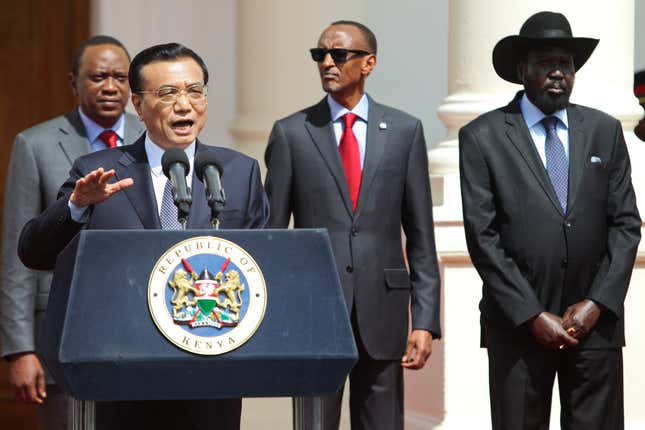
“The part that Rwanda wanted to learn was how China managed to grow despite its history. It’s not a matter of Rwanda emulating what China did but understanding the logic behind why China did not fail when it had such a complicated, bloody history,” Silas says.
But Rwanda has adopted some questionable practices that one might see in China. Rwanda has come under fire for ignoring human rights and for eradicating the appearance of poverty rather than the roots of it. Human Rights Watch claimed in a report earlier this year that police are rounding up and detaining homeless people, street children, hawkers, and keeping them in “transit centers” where they are often beaten.
Mutual suspicion
Not everything goes smoothly for the Chinese in Rwanda either. Some locals criticize Chinese companies for taking jobs and contracts away from Rwandans, complain that imported Chinese goods are of poor quality, and suspect Chinese visitors of everything from bringing in prison labor to fathering and leaving behind villages of illegitimate children.
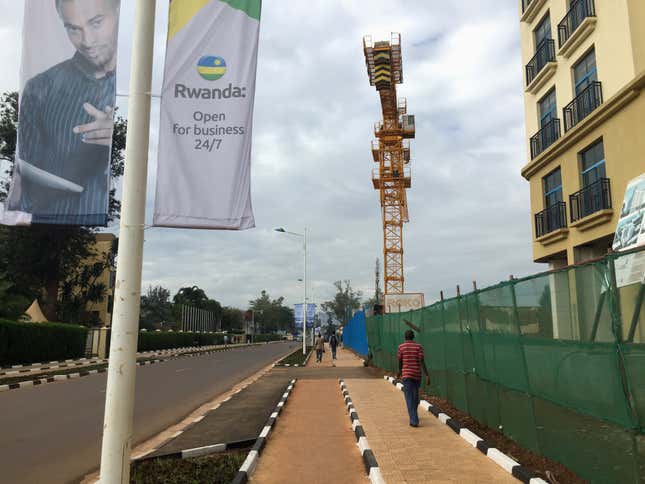
“You have to struggle with them, for equipment, for protection for the workers, for everything. Other companies, you don’t even need to ask. It’s automatic. But for them, [the goal] is to save money only,” says Jean Baptiste Rwigema, who has been overseeing a marshland for rice and horticulture being built in eastern Rwanda by Sinohydro, a large state-owned firm.
For their part, the Chinese also complain about trying to work in Rwanda. In the drought-ridden northeastern district of Nyagatare, residents said that a livestock watering system built by state-owned China Geo Engineering was starting to fail within five months. In response, China Geo accused its local partner and residents of breaking or stealing pipes and parts while the system was being built.
African countries could do more to ensure that projects like these are beneficial to them. Silas believes more effort is needed to ensure transparency when entering into partnerships with China or Chinese companies. ”Africans are willing to trade with China, but let’s be honest about what each is trying to achieve, and let’s be honest about how much of the benefit should be repatriated. There are some steps that should be put in place to defend African interests when dealing with China,” he says.
While Chinese migrants to Africa have been compared to Europe’s white settlers, in Rwanda, their goals are more modest. Most of Rwanda’s Chinese community of about 1,500 people, according to Edward Yin, head of the Overseas Chinese Association, are here only temporarily. Even those likely to stay for the long term say their goal isn’t to make it big, but to earn just enough and enjoy a nice life.
“The pressure is less here,” says Yin, who owns a travel agency, hotel and hot pot restaurant called A-Link. Yin, originally from Shenzhen in southeastern China, has been in Rwanda for more than a decade and isn’t sure about when he’ll return home. When pressed on his future plans, he uses an analogy he’s fond of.
“Fishermen take a boat and wherever there is fish, they fish there and then leave. Farmers, even if there’s a flood this year, next year they will still be working there. I think we are starting to have this kind of change here, going from fishermen to farmers.“
This story is part of a series about China’s engagement in Rwanda and reporting was supported by the International Women’s Media Foundation’s African Great Lakes Initiative.
